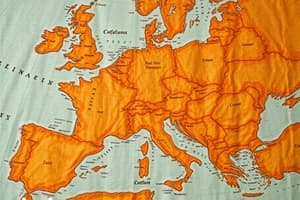Podcast
Questions and Answers
The Babylonian World Map is a literal representation of the world.
The Babylonian World Map is a literal representation of the world.
False (B)
What is the earliest known representation of a map?
What is the earliest known representation of a map?
- A map of the heavens (correct)
- A two-dimensional drawing of the earth
- A map of the ocean
- A plan of a city
What is the name of the city depicted in the Plan of Nippur?
What is the name of the city depicted in the Plan of Nippur?
Nippur
The earliest known maps were found on the walls of the __________________ caves.
The earliest known maps were found on the walls of the __________________ caves.
What is the shape of the world depicted in the Babylonian World Map?
What is the shape of the world depicted in the Babylonian World Map?
Hecatæus's map has a scale.
Hecatæus's map has a scale.
What is the center of the world according to Hecatæus's map?
What is the center of the world according to Hecatæus's map?
The Babylonian World Map is surrounded by __________________ and heavenly bodies.
The Babylonian World Map is surrounded by __________________ and heavenly bodies.
Match the following ancient geographers with their descriptions:
Match the following ancient geographers with their descriptions:
What is the name of the asterism depicted in the Lascaux caves map?
What is the name of the asterism depicted in the Lascaux caves map?
Flashcards are hidden until you start studying
Study Notes
Renaissance and Age of Exploration
- The Renaissance (1406-1700) led to a renewed interest in classical works, resulting in more accurate maps.
- The discovery of the Americas by Europeans revived interest in scientific mapping methods.
- Johannes Gutenberg invented the printing press in 1445, leading to the publication of printed maps in 1472 and 1475.
- Fra Mauro created a world map in 1477, and the first atlas, "Geography Bologna", was published in 1477.
- Christopher Columbus 'discovered' the Americas in 1492, leading to a new era of exploration and mapping.
- Martin Waldseemüller created the first true world map that included the New World in 1507.
Development of Cartography
- Eratosthenes (275-195 BCE) calculated the circumference of the Earth with an accuracy of 0.5%.
- Aristotle (384-322 BCE) proved the Earth's sphericity using astronomy and mathematics.
- Claudius Ptolemy (90-168 CE) revolutionized the depiction of the spherical earth on a map using perspective projection and a coordinate system.
Early Maps
- The earliest known maps are of the heavens, dating back to 16,500 BCE, found on the walls of the Lascaux caves.
- The Babylonian World Map (600 BCE) is the earliest surviving map of the world, depicting a circular shape surrounded by water and heavenly bodies.
- The plan of Nippur (14th-12th centuries BCE) is an engraved map from the Kassite period of Babylonian history, showing walls and buildings in the holy city of Nippur.
Ancient Greek Maps
- Hecatæus's map (500 BCE) describes the earth as a circular plate with an encircling Ocean and Greece in the center of the world.
- His map has no scale, similar to many other early maps in antiquity.
Cartography and Human Development
- Mapping represented a significant step forward in the intellectual development of human beings.
- Maps served as a record of the advancement of knowledge of the human race, which could be passed from one generation to the next.
Studying That Suits You
Use AI to generate personalized quizzes and flashcards to suit your learning preferences.




